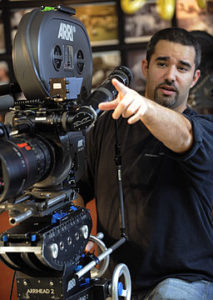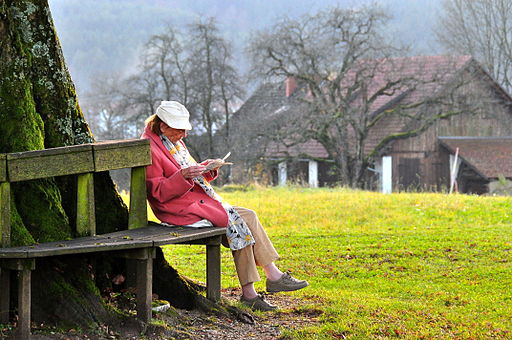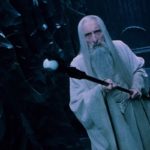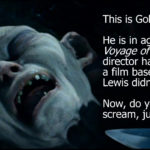Books Versus The Screen
Well, the show is great but the books are more so
– George R. R. Martin, re. the Game of Thrones.
 Once I saw a movie that was a true tragedy. As it happened, it was based on the life of a real person, and it was so sad. It moved so many in the theater to tears that you could hear sniffles coming from all around.
Once I saw a movie that was a true tragedy. As it happened, it was based on the life of a real person, and it was so sad. It moved so many in the theater to tears that you could hear sniffles coming from all around.
The movie had such a powerful impact on me that I decided to read the book. What a disappointment! I couldn’t believe what a let down it was. Apparently all the good parts of the movie were embellishments by the scriptwriter who wasn’t constrained by reality.
From that point on, though, I started noticing that books by and large trumped movies. TV wasn’t even in the running because the stories were too short to have any great impact.
Ah, but things have changed. TV now serializes stories, and in some ways serves as periodicals once did, doling out the equivalent of a novel or a novel series in bits week after week. In addition, technology has freed movies to create what we once thought could exist only in our imagination.
 And yet, as much as I loved the Lord of the Rings movies, with orcs come to life and a Gollum who was eerily as Tolkien described him, I think they come in a distant second behind the books. The Hobbit isn’t so different, but for other reasons.
And yet, as much as I loved the Lord of the Rings movies, with orcs come to life and a Gollum who was eerily as Tolkien described him, I think they come in a distant second behind the books. The Hobbit isn’t so different, but for other reasons.
We don’t need to think twice about the Narnia movies (though I still rebel at the idea that NOT having them made is a better option). I’d have to say the Harry Potter movies are wonderful–inventive, consistent with the direction of the books–and yet they, too, come up short in a comparison.
Years ago I read a book made from a movie, and in that instance, I gave the movie the top rating, but the vast majority of the best stories, it still seems to me, are within the pages of books, not on the little or big screen.
Of course others are free to disagree, and I look forward to your thoughts, but here are the reasons why I think books are better:
1) The characters in books are more engaging. That’s because the reader can get into their heads and know what they’re thinking and feeling. Few movies or TV programs can pull that off. (There was a TV program called Veronica Mars that had the main character narrate the beginning of each show and places of particular importance. The 80s show Magnum PI used that same deice with great success. MOST shows, however, leave the viewer in the comfy chair as an observer, rather than a participant with the character.)
 2) Books allow readers to imagine. Stories on the screen allow TV producers to imagine and directors to imagine and actors to imagine. Viewers, however, are primarily driven by what we see, not by what we imagine.
2) Books allow readers to imagine. Stories on the screen allow TV producers to imagine and directors to imagine and actors to imagine. Viewers, however, are primarily driven by what we see, not by what we imagine.
3) As a result, movies seem content to infuse the viewer with a shot of endorphins, adrenaline, or testosterone, as if inducing a chemical response is the ultimate in storytelling.
4) Books, in contrast, can make you think and give you time to do so. Yes, they also make you feel, but it has a greater impact, not lesser, because you’re more invested in the character (see point 1)
5) Books, the good ones, seldom seem outdated, whereas movies need to be remade with some frequency–except the good ones no one is willing to touch (Citizen Kane, Gone with the Wind–which desperately needs a remake, if you ask me).
If I took the time, I’m certain I could think of other advantages books have over visual storytelling, but these jumped out at me.
Do stories told with visual images have advantages over books? Certainly. Surprisingly, the first one that came to my mind was sound.
Movies and TV programs utilize music in a way that enhances a story. It can build tension or diffuse it, induce romance, suggest danger, create peace or . . . well, if you can feel it, music can enhance it.
Visual storytelling makes full use of that capacity, but also of sound effects.
The visual also brings to life the images which the words on a page have suggested. There’s something magic about seeing a hobbit house after reading about one and imagining what it might look like.
There are undoubtedly other advantages, and I hope you’ll point out the ones I’ve neglected.
However, I can’t help but wonder if we wouldn’t be losing something vital if visual storytelling crowded out books. Do you think that’s possible? Will the next generation prefer the visual so much they stop reading for pleasure?
Can movies or TV do as good a job telling stories as books can? Why do you think so? Or why not?
– – – – –
And speaking of books, don’t forget to pick the books that look most interesting to you from the list of Clive Staples Award nominees, and read, read, read. We want YOU to be an eligible voter.









































Not sure why the esteemed Mr. Martin would say that.
After all, with the books, you have to imagine writhing naked people in your own skull. But in the TV show you can actually see people get naked and get it on, which as we can all surely agree — certainly Mr. Martin, anyway — is far more interesting.
Thanks for bringing this up, Rebecca. Funny, but I just watched The Hobbit movie for the first time last evening and found it disappointing. I doubt I’ll watch the rest when they come out. Give me a good book over a movie any day!
You offer several likely reasons for this, but one you didn’t mention concerns the matter of reader interpretation v. screenwriter/director interpretation. With a book, your imagination is allowed to be swept away with the story; with a movie, your viewing experience is channeled through others’ viewpoints. You’re told how to visualize everything, how to interpret the situations, how to feel about it all.
It’s kind of like the difference between kids being allowed to play what they want, or having a recreation director schedule and organize their play time. There’s a place for both, but I’ve always liked free time better than organized fun.
I don’t understand this reaction, but I understand its prevalence.
Having just re-read the book, though, before seeing Part 1, and going in-depth into its surprisingly adult-level themes (particularly at the last), the film struck me as incredibly true to and respectful of its source material — more so than The Lord of the Rings, even. In this case, it helps to have more time, for example, to spend 45 minutes in The Shire and Bag End, time enough to relax, get to know Bilbo and the Dwarves, and to adapt, at most times nearly verbatim, the Unexpected Party.
Other additions, such as the extended Stone-Giant battle, Bilbo’s sneezing because of the ponies and subsequent failure to find his handkerchief, or even the arguably overdone goofy moments (e.g. the Goblin King’s torture song and mockeries) are either direct inspirations and extensions of book material, or “translations” thereof.
Folks who lament, say, the Dwarves falling all that much without harm should recall a) the book was, or at least begun life as, a children’s story; b) the original book had a troll-purse that actually talked; c) the original films had Legolas shield-surfing.
Also d) Dwarves are hardy creatures. And e) Peter Jackson can be a silly director.
Thus my term “translating”: the book’s silliness is translated to movie-silliness.
Probably the main difference between our opinions, Stephen, is personal taste. I see what you’re saying, and I don’t disagree in concept. But the elaborations on the book seemed–at least to my mind–more like Roadrunner cartoons than the sweet simplicity of The Hobbit story that lives in my mind. I’ve had those private images imprinted in my brain for nearly fifty years (argh – I just now figured out how long it’s been since I was in 4th grade), and the images in the movie are too far removed from those cherished memories for me to be happy with them. I feel like I imagine I would if someone drew silly mustaches and beards on the people in an old family portrait.
Eh, they include the scenes, but Jackson recasts them to a completely different purpose in the book, and when you combine it with the new additions it becomes more of “LOTR-the prequel” than The Hobbit. That scene where all of them were treed got destroyed when Thorin…jumps off the tree like an idiot and decides to go one-on-fifty with Azog and his orc buddies. Even something like the dinner was changed, where the Dwarves just barge in to his house. Gandalf originally introduced them two-by-two so Bilbo would accept them.
It feels like Jackson is fixing the original book to harmonize better with the later trilogy, and that’s something people might have mixed opinions on. It’s a good example of Rebecca’s thesis, and a good discussion point for how translation or redoing can make a work differ even if it takes many of the plot points as gospel.
I read verrrry slowly. I just finished book one of the Hunger Games trilogy that I started reading over Christmas break. So, I had to chuckle when I read your 4th point (“and give you time to do so”). This is so true. Sometimes, it gets to the extent where books give me too much time to think about it. I analyze plot and characters to death when I read (and when I watch movies as well).
I had a thought while reading this article, though. What are your top 5 favorite movies? Top 10? Not including the recent movie adaptation of the musical adaptation of the play adaptation of the book Les Miserables, I have to go waaaaay down my movie favorites list to find a book adaptation. Most book adaptations pale in comparison to their source material for, in my opinion, two reasons.
Movies are relatively new and cutting edge technology. In my work as a software engineer, I find quite often that software that is new is not very polished. Books and written word storytelling has been around for multi-millenia. Movies have been around for what? A hundred years? Two hundred maybe? It’s still very much a developing field. Not that written storytelling isn’t still developing, but it has a bit of a head start. Also, new technology that is “replacing” prior technology often tends to mimic and copy the technology that came before. This is because the inventors, no matter how intelligent, can only create from what they know.
And this brings us to the second reason book adaptations fall short. They are attempting to mimic written stories. And this is a problem. Books and movies both have plot, character, theme, etc. but they are extremely different mediums. Movies cannot present plot the same way books can. Nor can they develop characters the same way. Movies excel when they use the strengths of their medium not their weaknesses. In addition to the music and sound effects that you mentioned, there are also facial expressions, colors, and faster pacing options.
Written and visual storytelling tell different stories better than their counterparts. If you’re still not convinced, try reading (or writing) a book adaption of a movie. They are painful.
There are always going to be times where “a picture is worth a 1000 words”. There are also, I believe, always going to be times when “a word is worth a 1000 frames”. Translating between the two is an art in itself and it requires someone fluent in both mediums.
Well said!
Oddly enough, I had a conversation with a friend this afternoon on a similar theme to this blog post, how books and movies are two very different storytelling mediums. In general, I would say the best books and movies are also the ones that are most difficult to translate between mediums.
As examples, two of my favourite movies are Ink and the Emperor’s New Groove. I don’t think either one would work well as a book.
Re: Emperor’s New Groove
Written action could not capture the craziness or fluidity of the style of animation and much of the dialogue would not be nearly as funny without the voice actors’ masterful use of tone.
Re: Ink
The music! Ah, it sold me on the movie before I ever watched it and a lot of the atmosphere of the movie stems directly from it. The story’s characters and character development benefit from not knowing exactly what is going on inside their heads. Also, the interplay between reality and dreams and nightmares with scenes inside of scenes.
Ink in particular is a good example of a movie that defeats both reasons 1 and 2. It is true that you don’t know what the characters are thinking but you definitely get a good idea of what they are feeling through the use of facial expressions, body language, tone, camera angles, lighting, etc. It is different than the way you would engage with a character in a book but it is equally effective. Also, there is plenty left up to the viewer to imagine. Sure you don’t have to imagine what the characters or world look like but you don’t know get as many how or why explanations (which, imho, can be more fun to imagine than a character’s appearance).
I think one of the reasons book to movie adaptions can be so disappointing is that the people behind the making of them don’t stop to consider how much of what makes the story amazing is dependent on the medium. It’s more of a POPULAR = MONEY! kinda thing. 😛
1,000 frames = 41.67 seconds of film, or 20.83 seconds of The Hobbit. ;-p
I think David makes very good points. It’s true that most books are better than the movies based on them. It’s even more true that most movies are better than their novelizations. You’re more likely to hear, “Those Lord of the Rings books were great, but I prefer the movies” than, “Those Stars Wars films are great, but I prefer the novelizations.”
The medium and power of books is the written word. The medium and power of movies are sight and sound. A skilled artist, using his own medium to its fullest extent, will create something that cannot be fully recaptured in another medium.
No writer, creating a paper version of Star Wars, can retain John Williams’ musical score. And even the best director cannot replicate the most beautiful of Tolkien’s prose. There’s something irreplaceable in hearing great music, and something irreplaceable in reading great writing.
It’s fair to criticize a movie for not being more like the book only if being more like the book would make it a better movie. For example, certain people criticize the Lord of the Rings movies for cutting Tom Bombadil and the scouring of the Shire. In truth, no movie-maker with any sense would include either one. Tolkien can take two hundred pages getting to Bree, but a director doesn’t have that kind of time.
And the scouring of the Shire – well, that was a mistake even in the book.
Random sidenote: the Revenge of the Sith novel is better than the movie. I love the use of head hopping and the character tangents and the ending is perfect. It uses cliche metaphors and language but somehow the emotional impact is irresistible.
I have no idea if there is anyone else in the world who feels this way about the book… *sheepish* 🙂
I used to think I wanted to see all my favorite books turned into movies, assuming they were done well and faithfully adapted. Now there’s only a bare handful of books I think would make good movies. The two mediums are very different, with different strengths and weaknesses. TV shows are another medium altogether, distinct from movies. I honestly could not pick a favorite of the three. All of them have the ability to move me deeply and make me think.
One of the strengths of film that wasn’t mentioned is the actors. The ability to see a talented actor’s face and hear their voice when they deliver a line is priceless. There are so many nuances of facial expression that are impossible to describe in the printed word.
Alassiel, I think you make a good point about the actors. It’s the really gifted ones that enable the viewer to connect with the characters. It’s not only facial expression but delivery of lines–timing, inflection, pitch–all those contribute something we can imagine, but the actors that do it well make the characters live.
Becky
There are some books that I think should never be made movies, and some movies that would make horrible books.
One of the advantages visuals do have over books is the use of tone. I’ve been trying to write certain scenes and I keep having problems conveying the tone.
Once upon a time, I actually thought of going to film school. For the most part, realizing what Hollywood is like, I do not regret my decision not to. However, I still have a love of film, and what it can do. I think that one can almost go on a case-to-case basis on whether a certain film is better than the book or vice-versa. But overall, you just have to remember that the two are simply different ways of telling a story. Some stories may actually be better served in the visual medium, and others may be better left to the imagination. I, for one, am glad that both are available.
Robert, I agree that the two are different and for that reason I hope we never get the idea that screen storytelling is better. It falls short a lot of the time. One of the obvious ones I left off my list is time–when movies would be too long if they told the story in the same way the book did.
Over the last month or so our local classical music radio station has been playing Wagner’s Ring opera every Saturday. Four hours a pop, I believe. (I’m not an opera fan but have caught the intro when they’re giving the synopsis of the story). I bring this up because clearly this is an EPIC story. That it’s put to music lengthens it, I’m sure, but the point is, a lot of books, if the movie were made that would be as epic, would have to be so long no one would stay in their seats–or they’d complain because they had to come back and pay again, or that they had to wait for six months or a year or two. In other words, doing a book justice sometimes means the movie isn’t going to work as a movie.
Shannon mentioned this, though I think she had other things in mind besides the length.
Becky
Point 5 isn’t really an advantage; the good movies are about as dated as the good books, and the bad ones of both can be horrifically so. A good example is reading William Gibson’s Neuromancer today, and realizing that no one has mobile phones in the book. Or Stephenson’s Snow Crash, and the idea that we’d have a 3-D representation of the web as the default way we interact with data.
Some books have been “restored,” too. If you read Judy Blume, her Fudge books have subtly had some of the dated references edited out and replaced with modern ones. Nancy Drew has been extensively rewritten, and is available in classic or modern editions.
I do agree books are superior to their movie adaptions. When you read a book, it’s you and the author. When you watch a movie, it’s you, the author, the screenwriter, the director, and a lot of other people, and it’s hard not to lose something with all the cooks cramming into the kitchen.
I don’t know, D. M. People are still reading Pilgrim’s Progress and Canterbury Tales hundreds of years later. I doubt if that will happen with film. Even the two classics I mentioned–Citizen Kane and Gone with the Wind–no one really watches them any more.
And by the way, if anyone decides to remake Gone with the Wind, I hope they make it in three movies instead of rushing through it in a couple hours.
Becky
On a brief tangent based on your comment, D.M., I must say I don’t care for updating books. What is wrong with having them set in another time period? I loved Alfred Hitchcock and the Three Investigators growing up, and was distressed to see that they had been rewritten to all be Hector Sebastian mysteries in updated versions. Hector Sebastian was a fictional character brought in specifically to take Hitchcock’s place when he died, and the book in which that happened actually went to lengths to note the great director’s passing. By replacing his character, they not only did a disservice to the man, but to the era to which those books hearkened. When I collected them later, I made sure that I had the originals (or as close as possible). I mean, what’s next, Orwell’s 2084?
I’m with you, Robert. The thought of “updating” a book just seems silly.
But then I don’t like the modernizing of a lot of the movies and/or TV shows. I think they do that to save money–contemporary is probably cheaper to portray than 19th century London (I’m thinking of Elementary the TV redo of Sherlock Holmes. Sorry. It might be good, but I can’t get past the changes to an iconic story to give it a chance.)
Becky
Books and films both have advantages and drawbacks. Here are two of ’em.
Book advantage #1: No constraints of time. By this I refer not only to the fact that novels, unlike the vast majority of films, don’t have to limit their pagecounts based on the capacity of their readers’ bladders, but also to the fact that a writer has the Godlike privilage of stepping outside the normal current of time. Centuries can be summarized by a single sentence. The blink of an eye can unfold over an entire chapter. Films, on the other hand, take place in realtime, surreally augmented when necessary by montage or overcranking. It’s incredibly difficult for a film to transcend this limitation without straying into either straight-up comedy or manipulative sentimentality. And let’s not forget that books have all the time in the world to build their characters and advance their plots and develop their themes. The average screenplay, on the other hand, consists of only 120 pages, each of which contains only about 200 words, since screenplay formatting gives precedence to white space. Words take much longer to speak aloud than to read silently in one’s head. In fact, films tend to reverse the proportional pacing of books: on the screen, dialogue seems lengthy and tedious rather than brisk, and actions that would’ve required paragraphs of written description transpire within instants. But books wield the greater flexibility.
Book drawback #1: Lack of immediacy. How do we describe particularly riveting novels? We call them “cinematic.” Books and films can sink their hooks equally deep into an audience’s psyche, but books require much more time to do it. The reader must first ingest the story’s elements, internalize them, and refashion them through his own imagination before he can “enter the story.” This is not a straightforward process, and a good book will give the reader plenty of space to get comfortable in a character’s head before asking that reader to cry that character’s tears. With film, however, the hard work of imagination has already been accomplished by hundreds of dedicated professionals. As a result, we the audience are ready and willing to be swept off our feet and immersed in the immediacy of our sensory experience. Films offer the sort of experience only enjoyed in books, I think, by an elite, imaginative minority. Instead of imagining things alongside an author, we are plunged directly inside a storyteller’s imagination. No matter how adept I am as a writer, I’ll never manage such a precise mind-meld.
Re: book advantage 1, how much of the advantage of books in time flexibility is a result of the difference in cost of production? I can’t think of any particular reason why you couldn’t turn on and turn off a movie the way you pick up and put down a book. Movies are limited to less pages of story because of how much more is involved in the making.
A brilliant book requires the blood, sweat and tears of a minimum of one person using at least one device (e.g. computer). A brilliant movie requires the blood, sweat and tears of a minimum of dozens of people using a variety of equipment (with a short animated film being the possible exception). <–another good example of a movie that would not work as a written story
Admittedly some of the ways movies manipulate time involves "cheating" by using written words (e.g. having the words "three hundred years pass" appear in a movie is just as effective as writing the same sentence in a book) but that doesn't make the movie any less flexible in terms of passing time.
Regarding the reverse (the blink of an eye unfolding over an entire chapter), a movie can potentially be more effective in slowing down time than a book. Picture a scene where someone in a movie is shot. The split second event can be very effectively slowed down by the muffling of some sounds (like crowd noise) and the heightening of others (like breathing) and by moving between the slightly slowed actions and reactions of different characters.
A written portrayal of the same event elongated would not have the same feel.
I also disagree that books suffer in terms of immediacy. (But then I've never described a book I like as cinematic either :P)
Films — especially spec fiction films, which usually require substantial budgets — are created and marketed for the big screen. If they’re not, they make no money. And while one can certainly pause a DVD at home to go work or sleep or play outside, an audience in a darkened theater can only hold its collective bladder for so long. That’s why films must tell their stories within a strict one-and-a-half to three-hour timeframe. The sheer cost and complexity of film production can be limiting, certainly, but those aren’t absolute limitations. After all, long-form TV shows keep telling the same stories twenty-four hours per year. But theatrical time limits are not to be trifled with.
As for time-manipulation, I think it’s typically much more tricky on a screen than in a book. Take that moment you mentioned in which a character takes a bullet. An author, in that moment, is able to plunge directly into a character’s mind and heart — feeling his terror and rage, remembering with him why he loves the gunshot victim, speculating on how this tragic event has changed everything. Because the conscious mind will always lose to the subconscious in a race, paragraphs’ worth of intense mental activity can transpire before the body hits the ground without any of it feeling weird or forced. But the filmmaker — what can he do? The mind is off-limits. He can only work with what can be seen and heard. If he cuts to a flashback, it’ll deflate tension. If he injects voiceover narration, it’ll rightly seem like a pathetic crutch. If he slows down time by overcranking, he’ll court melodrama (think of all the infamous scenes in which a character reaches an impotent hand toward the screen in slo-mo while screaming “NOOOOOOO ….!!!”). The audio tricks you describe are quite effective at simulating shock, but can’t reach much deeper than that. The filmmaker’s options are limited.
As for the acceleration of time, the distinction between books and film is, as you’d expect, found inside the characters’ heads. Yes, a film can time-lapse its way through a day, a week, or a year, but that reveals nothing beyond the fact that time has passed. Yes, a film can elapse time quickly through montage, but some character emotions, such as grief or bitterness, tend to fare poorly through that treatment. It seems too quick, too easy. A book, on the other hand, can say something like “As the years passed, his idealism shrank like a flower furling for a night of frost,” and our imaginations will dutifully fill in the gaps. We can watch time pass while on the inside looking out instead of from the reverse position.
But the fact that movies make most of their money through theatrical releases right now does not mean that they will always do so. It isn’t inherent to the medium.
Story as film is just as accessible to an individual in their own home as story as book.
A long spiel of flashback in a book is just as tension dropping as a flashback in a movie. I can see how the two mediums are different but I still don’t see how books have the advantage.
A movie could have voiceover or text saying “As the years passed, his idealism shrank” against the visual backdrop of a flower furling as frost overtakes it. (rough example)
A ten-hour film, while theoretically possible, is commercially impossible. The closest real-world example would be the mini-series, which must adhere to the rules of television. One might as well speculate that it’d be theoretically possible for a book to describe every single instant in a person’s life without eliding a thing. Yes, it’s possible. Has it ever been done? No. If a multi-generational team of authors were to meet the challenge, would anyone read their book? Nope. Movies over three hours long are, with rare exceptions, just as pointless as that particular reductio ad absurdum.
You’re right that a book’s flashback can be just as distracting as a film’s, but an author, due to his supremacy over the flow of time, has far more options. In the same way that a week’s worth of action can be condensed into “The next week was just as bad, and by Thursday John Doe was making fists inside his pockets every time he passed the machine,” a relationship can be specified in a moment of tension by something as simple as “John Doe saw her fall, she whose voice perfused his thoughts, and when she struck the ground his mind fell silent.” I’m not saying it’s impossible for a film to achieve a similar effect; I’m saying that the ease with which a novel does this goes a long way toward explaining why many people feel that films seem shallow by comparison.
The cardinal rule of visual storytelling is “Show, don’t tell.” That’s why narration and on-screen text are both generally ill respected in film: they’re tantamount to a tactical retreat from the limitations of the art form. Like a child’s scratch-and-sniff book, narration- and text-heavy films don’t bother to actually tackle the challenge of translating an experience into their artistic medium. They tell instead of show.
Your idea of juxtaposing a furling flower with the shrinking idealism as a visual metaphor is striking, though. That’s a technique used in ‘experimental’ film. The films of Terrence Malick are probably some of the most accessible examples of this form, but most people walk away from those ‘stories’ scratching their heads. Unless a filmmaker patronizes his audience by redundantly telling them how they should interpret his visual metaphors, he’ll have to leave meaning implied. He can’t simply wedge the word “like” in between his comparisons like an author can. Metaphors are far more direct in books than in films. Whether that makes them stronger, however, is arguable. 😉
I acknowledged that the cost of making a film makes long films unlikely but that still isn’t a reason that the medium couldn’t be be experienced in a turn it on/turn it off over the course of a week way. Just because people have always experienced film one way doesn’t mean it always has to be that way (admittedly production costs will probably never go down enough to make it possible).
It’s like the opposite of what most people do with the Bible. Church brats* grow up more or less conditioned to read the Bible a few chapters (or a few verses) at a time when really there is no reason why full a book (or multiple books) couldn’t be read in one sitting (Psalms in one sitting is exceptionally long but most of the books are really short).
Why not imagine movies that you would experience an hour or two at a time? Imagine how much deeper and more in depth the stories could be.
*Clarification: this is a complimentary term, in case anyone doesn’t read it that way. And I blame Kaci for making me think it is a universal term. 🙂
To my mind, your appeal to revolution regarding film serves to highlight another crucial distinction between the screen and the page: while a sprawling, epic novel can spring from the mind of a single individual working alone and uncompensated in front of a cheap word processor, the creation of a quality film requires intensive and well-organized collaboration between a small army of specialists. Even the quaintest low-budget indie drama needs a writer, a producer, a director, a DP, an editor, a composer, a gaffer, a set designer, a camera operator, and actors to bring it to life. Locations must be scouted, shooting permits obtained, transportation arranged, and catering provided to stave off the ever-impending mutiny of the cast and crew. A small fortune must be expended on cameras and lenses and lights and jibs and props and all manner of accoutrements necessary to capture shots worth sharing with viewers. Expensive editing software and copious storage space and powerful computers become essential even before the final take wraps on set. And then there’s the time and effort necessary to market and distribute this culmination of so many hopes and dreams and frantic all-nighters …
And that’s just for a film one could conceivably make with one’s friends. If it’s something more ambitious — more speculative — deep pockets are required. Pockets that can support extravegant set pieces and the innumerable CGI artists necessary to make audiences believe the impossible. At every step of the process, nothing’s as easy as it looks. That’s why large-scale filmmaking requires a Hollywood-sized industrial base.
And that’s another reason authors have it easy.
One more thought (sorry!)
Sometimes books have the musical advantage over movies. Counter-intuitive maybe but consider it.
One of my most favouritest (extraneous superlative intentional) things about the Lord of the Rings is the verses in it. There are several variations on a few of the songs that can be found and listened to (and a Danish group has put ALL of them to music) but none of the versions composed so far has impacted me the way the reading of the music did.
(Sidenote: Howard Shore’s soundtrack is easily the best thing about the movies though)
Another example would be Rue’s lullaby in the Hunger Games. That scene sold me on the book. But I can’t find a satisfying “real” version of it and I don’t think one could be made. The idea of the prose as a mountain air is beautiful in the context of reading silently but the rhythm is incredibly awkward if you try to sing it out loud. (Someone please correct me if you can make it work!)
Your own imagination is always more powerful than someone else’s. I think that’s the main reason readers always prefer the book-version of stories.
Regarding songs in particular: I think Peter Jackson’s stripped Tolkien’s verses from his films simply because he didn’t want to make musicals. I don’t agree with what he’s done, but it does seem logical from a certain point of view. Because films must tell their stories within such strict time-constraints, they don’t have any opportunities to entertain distractions from the plot. And the songs of Middle-earth, excepting a few composed-in-the-moment pieces like the Elegy for Boromir, certainly count as distractions. They distract us from the immediacy of our predicament by alluding to a depth of history and culture that puts things in perspective. Peter Jackson found that prospect unproductive. The two verses of “Far Over the Misty Mountains” which survive intact in The Hobbit testify to the fact that Jackson could’ve done Tolkien’s songs justice had he wished to. If I’d written the screenplays, I would’ve found ways to incorporate the songs without slowing the plot. But there you have it: another advantage for the written word thanks to the time constraints of film.
Watching a movie is basically a passive experience. (Just put those dogs up, and pass the corn!)
But reading a good book is far from passive. It is mentally demanding. Your mind fills in the visuals a film feeds to you, and you enter into the thoughts and feelings of the characters in a much more intimate way that film as a whole.
They are just two different mediums who have different strengths, and though I do it all the time, it’s best not to compare.
Good point, Steve. Movies are much more passive, as is TV, which is why we’ll plop down in from of the tube when we’re tired instead of picking up a book.
I also forgot one other thing I think books have over screens stories–smell. Much easier to render scent with words than with images. 😉
Becky